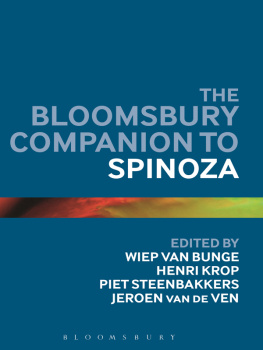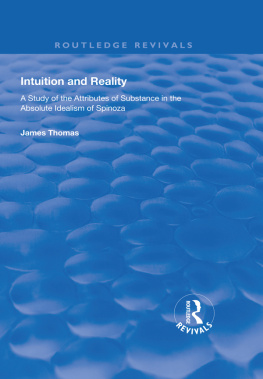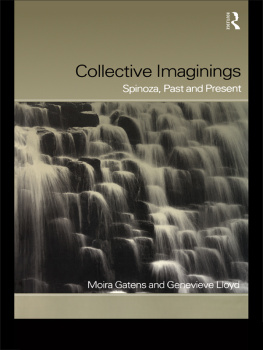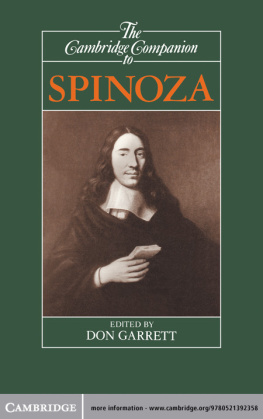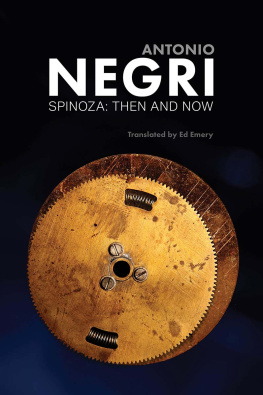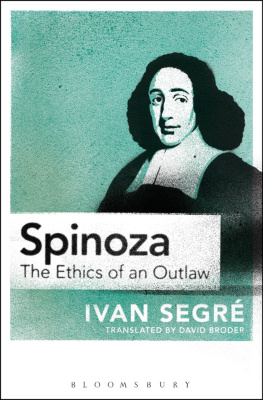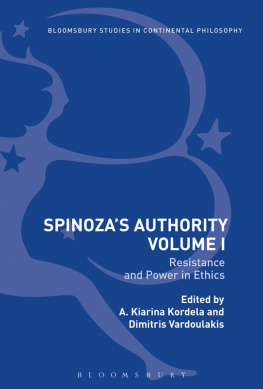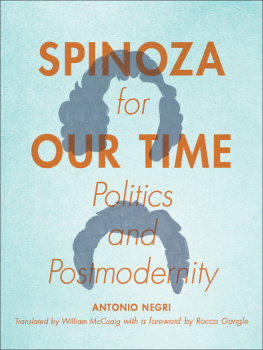The Bloomsbury Companion to Spinoza
Other volumes in the series of Bloomsbury Companions:
Aesthetics, edited by Anna Christina Ribeiro
Analytic Philosophy, edited by Barry Dainton and Howard Robinson
Continental Philosophy, edited by John Mullarkey and Beth Lord
Epistemology, edited by Andrew Cullison
Ethics, edited by Christian Miller
Existentialism, edited by Jack Reynolds, Felicity Joseph and Ashley Woodward
Hegel, edited by Allegra de Laurentiis and Jeffrey Edwards
Hume, edited by Alan Bailey and Dan OBrien
Hobbes, edited by S.A. Lloyd
Kant, edited by Gary Banham, Dennis Schulting and Nigel Hems
Leibniz, edited by Brendan Look
Locke, edited by S.-J. Savonious-Wroth, Paul Schuurman and Jonathan Walmsley
Metaphysics, edited by Robert W. Barnard and Neil A. Manson
Philosophical Logic, edited by Leon Horston and Richard Pettigrew
Philosophy of Language, edited by Manuel Garcia-Carpintero and Max Kolbel
Philosophy of Mind, edited by James Garvey
Philosophy of Science, edited by Steven French and Juha Saatsi
Plato, edited by Gerald A. Press
Political Philosophy, edited by Andrew Fiala and Matt Matravers
Pragmatism, edited by Sami Pihlstrm
Socrates, edited by John Bussanich and Nicholas D. Smith
THE BLOOMSBURY
COMPANION
TO SPINOZA
GENERAL EDITORS
Wiep van Bunge
Henri Krop
Piet Steenbakkers
Jeroen van de Ven
Bloomsbury Companions

CONTENTS
Today, Baruch or Benedict de Spinoza (163277) is widely considered to be one of the greatest philosophers who ever lived. Despite his early death at the age of forty-four, his stature and reputation now equal those of contemporaries such as Thomas Hobbes (15881679), Ren Descartes (15961650), John Locke (16321704), Gottfried Wilhelm Leibniz (16461716) and Pierre Bayle (16471706), who all lived much longer. Apart from his expulsion in 1656 from the Portuguese-Jewish community of Amsterdam and his recorded anger over the assassination, in 1672, of the Grand Pensionary of Holland Johan de Witt and his brother Cornelis, the story of his life seems relatively uneventful. His biography testifies first and foremost to the philosophers total commit-ment to his work. Spinozas correspondence, consisting of some eighty odd letters to and from the Dutch philosopher, is largely concerned with the details of his philosophy. Hence, much of Spinozas life remains in the dark and research into the particulars of his biography continues to inspire the experts. We know much more about the details of the lives of Hobbes, Descartes, Locke, Leibniz and Bayle than we do about Spinozas and they all produced much more voluminous Collected Works.
Spinozas Tractatus theologico-politicus, published anonymously in 1670, has recently enjoyed considerable scholarly attention, yet to most contemporary readers Spinoza is still essentially the author of a single masterpiece, the Ethics, published posthumously in 1677. The Ethics, however, composed in Latin and modelled on Euclids Elements, has always been regarded as an exceptionally difficult book, if only on account of the austerity of its language and its geomet-rical method. Up to this day it has given rise to diverging and even conflicting interpretations, as has the issue of the precise relationship between the Ethics and Spinozas other works.
Following the format of this series, the opening section provides an overview compiled by Jeroen van de Ven of the documentary evidence now available relat-ing to Spinozas life. This chronicle aims to be complete, and it clearly shows the many lacunae still facing every potential biographer. The next section, on the influences on Spinozas thought, was edited by Piet Steenbakkers. It does not claim to deliver a complete picture of all the sources at work in Spinozas phil osophy, but we feel it would be folly even to attempt supplying such an exhaust ive list. More often than not Spinoza is silent about his sources, but then he was no humanist scholar: as a follower of the newly created Cartesian school in philosophy he attached small importance to traditional scholarly erudition and so he may not always have felt the need to clearly indicate where his ideas came from or how they related to those of other thinkers.
The appeal Spinozas works held and still hold for many readers should not hide from view the widespread revulsion his ideas also incited. We now know that from a very early stage Spinoza was admired across the length and breadth of Europe, but the large majority of his early readers were appalled by his athe-ism, his materialism and his fatalism. From the 1670s onward dozens of refu-tations were published, and the section Early Critics, compiled by Wiep van Bunge, provides an anthology of some of the objections raised against Spinoz-ism as a comprehensive philosophy. Opinions will vary as to the effectiveness of much of the polemical energy vested in dismantling Spinozas philosophy, but we feel the opposition to Spinozism remains an important and fascinating aspect of its presence in early modern philosophy.
The largest section fell under the responsibility of Henri Krop. The Glossary contains a rich collection ranging from short notes to minor essays on the con-cepts which together make up Spinozas thought. By spelling out Spinozas con-ceptual vocabulary, or rather by having a wide variety of experts do so, we hope to be able to shed new light both on the origins and inner logic of Spinozism as well as on its details. Fortunately, the contributors to this particular section dis-agree on several aspects of Spinozas thought. As a consequence a multi-faceted picture emerges, which we hope will serve to provoke further reflection.
The next section is the work of Piet Steenbakkers. His Synopses provide a summary of Spinozas writings, including the ones less familiar even to the experts such as Spinozas Hebrew Grammar. The final section, a short essay on the history of Spinoza scholarship, was written by Wiep van Bunge. As editors we have also written many of the entries brought together in this volume, but we have constantly tried to keep the kaleidoscopic nature of this project intact, for this book was edited by Dutchmen, but co-written with a host of colleagues and friends from the Netherlands, Belgium, France, Italy, Switzerland, Finland, the United States and Canada.
Despite the quiet and brevity of his life as well as his relatively small output, Spinoza continues to inspire philosophers, historians, scientists but also laymen without any professional interest in Spinoza. We hope this Companion may help to stimulate further reflection and research on the Dutch philosophers life and work.
The Editors
The editors would like to thank the Continuum International Publishing Group for its support of this project. Rudi Thoemmes and Merilyn Holme in particu-lar have been a great help. So have been Bart Leeuwenburgh of the Erasmus University and, again, Michiel Wielema for his editorial assistance. Michiel has saved us from many mistakes. Although this Companion has become a very different book from The Dictionary of Seventeenth and Eighteenth-Century Dutch Philosophers (2003), it was a great pleasure to have so many members of the quipe responsible for the publication of the Dictionary willing and able to produce this sequel. Our Rotterdam colleague Paul Schuurman, co-editor of the Continuum Companion to Locke
Next page
